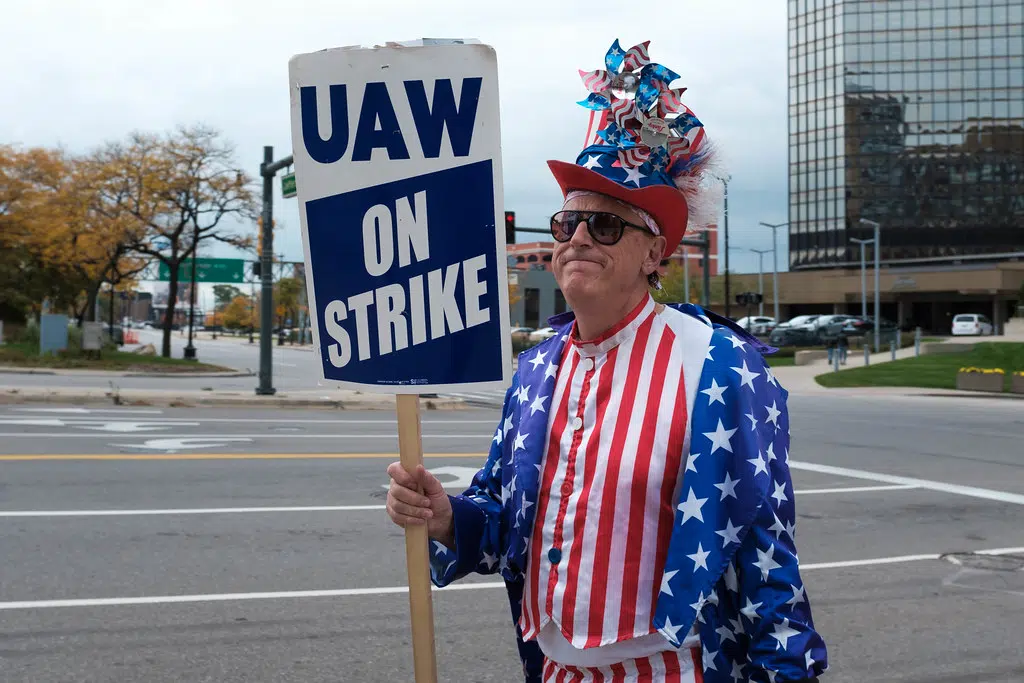The UAW strike against the Big-3 automakers has so far not had too much impact locally – but it could. An extended strike could very well begin to show up locally, considering that some area manufacturers do supply the industry.
WHBL News spoke with Ken Muth Jr. of Muth Mirror Systems, which is the leading supplier of LED-based mirror displays for blind spot, lane change assist and future active safety systems, equipment that’s installed on over 49 vehicle brands around the world, and some of those involve the big three automakers now being targeted by the UAW. The Ford Bronco uses Muth Mirrors, as do some Jeep products made by Stellantis, makers of the Chrysler brand. Muth says that while an extended strike could impact them, it wouldn’t be as significant as that felt by many other suppliers. That’s because, he said, they’ve diversified globally over the past 10 years, and the domestic market makes up only around 15% of their revenue. They’ve also become accustomed to the ongoing supply-chain issues, which have recovered to only about 75% of the capacity before COVID, providing some extra flexibility against unfavorable market conditions.
Another local manufacturer, NEMAK, likely stands to be impacted more significantly, as it makes vehicle structures and powertrain components such as cylinder heads, engine blocks and transmission cases that are sent to the Big-3. Calls to NEMAK were not returned, and so we couldn’t obtain any figures on exactly what those impacts could be.
Historically, Muth said that strikes have gone up to 5 weeks, such as the last UAW action against GM four years ago. And with a four-year cycle of contract talks being led by new UAW President Shawn Fain, he is faced with “blazing his own trail” with the members. Muth said that if he can get much of what’s being demanded, he’d look very good in the workers’ eyes and stand a better chance at getting re-elected. But many of the demands he’s spearheading, Muth said, can’t be achieved. Muth said that the wages now being discussed with Ford have come down from 40% increases to 30%, providing some progress. But the demands to work a 32-hour week and be paid for 40 hours is untenable, saying that “Nobody in our country can offer a 32-hour work week and be profitable and do it well.” He also said that making retroactive compensation for pensioners would be another difficult point to achieve.
While the Union can exercise its strength by increasing the numbers of factories it strikes, as they did last Friday, the industry can also close plants. He said that this is an option of the Big-3, as closing all doors would quickly draw down the Union’s so-called “War Chest” of some $850 million that’s used to pay striking workers, and that’s an option that we should prepare for if progress isn’t made. Ultimately, Muth said, the global market may also become a factor, as the UAW already pays the highest wages in the world, and satisfying a majority of the demands could make the US very uncompetitive with other global labor markets.
We also contacted Tim Tayloe, President of UAW Local 833 which represents Region 4 workers, including the Kohler Company. He said that as they reached their contract agreement last year, they won’t be directly affected. He did say that Kohler makes some parts for the auto industry in the foundry, and that could have some effect, but not enough that an extended strike would shut them down. As for solidarity motions with the rest of the UAW, Tayloe said that there hasn’t been any talk of that so far.






Comments